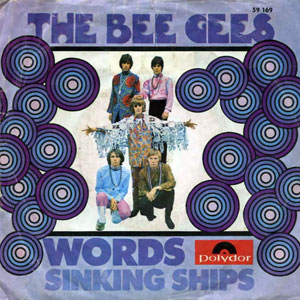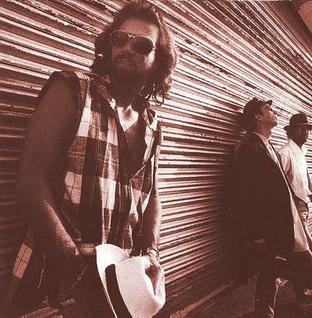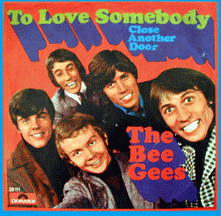
"Jive Talkin'" is a song by the Bee Gees, released as a single in May 1975 by RSO Records. This was the lead single from the album Main Course and hit number one on the Billboard Hot 100; it also reached the top-five on the UK Singles Chart in the middle of 1975. Largely recognised as the group's comeback song, it was their first US top-10 hit since "How Can You Mend a Broken Heart" (1971).

"Emotion" is a song written by Barry and Robin Gibb. It was first recorded by Australian singer Samantha Sang, whose version reached number three on the Billboard Hot 100 chart in 1978. The Bee Gees recorded their own version of the song in 1994 as part of an album called Love Songs, which was never released, but it was eventually included on their 2001 collection titled Their Greatest Hits: The Record. In 2001, "Emotion" was covered by the American R&B girl group Destiny's Child. Their version of the song was an international hit, reaching the top ten on the US Hot 100 chart and peaking in the top five on the UK Singles Chart. English singer Emma Bunton also covered the song on her 2019 album My Happy Place.

"Tragedy" is a song released by the Bee Gees, written by Barry, Robin & Maurice Gibb, included on their 1979 album Spirits Having Flown. The single reached number one in the UK in February 1979 and repeated the feat the following month on the US Billboard Hot 100. In 1998, it was covered by British pop group Steps, whose version also reached number one in the UK.

"You Should Be Dancing" is a song by the Bee Gees, from the album Children of the World, released in 1976. It hit No. 1 for one week on the American Billboard Hot 100, No. 1 for seven weeks on the US Hot Dance Club Play chart, and in September the same year, reached No. 5 on the UK Singles Chart. The song also peaked at No. 4 on the Billboard Soul chart. It was this song that first launched the Bee Gees into disco. It was also the only track from the group to top the dance chart.

"Words" is a song by the Bee Gees, written by Barry, Robin and Maurice Gibb. The song reached No. 1 in Germany, Canada, Switzerland, and the Netherlands.

"The Grease Megamix" is a megamix released in 1990 to commemorate the video release of Grease. The single was credited to John Travolta and Olivia Newton-John and released via Polydor Records. It was created by Phil Harding and Ian Curnow for PWL by the request of Polydor Records, who supplied copies of the original multi-track recordings. The megamix topped the charts of Australia and Spain and became a top-five hit in Denmark, Ireland, the Netherlands, Norway, and the United Kingdom.

"You Win Again" is a song written by Barry, Robin and Maurice Gibb and performed by the Bee Gees. The song was produced by the brothers, Arif Mardin and Brian Tench. It was released as the first single on 7 September 1987 by Warner Records, from their seventeenth studio album E.S.P. (1987). It was also their first single released from the record label. The song marked the start of the group's comeback, becoming a No. 1 hit in many European countries, including topping the UK Singles Chart—their first to do so in over eight years—and making them the first group to score a UK No. 1 hit in each of three decades: the 1960s, 1970s, and 1980s.

"How Deep Is Your Love" is a pop ballad written and recorded by the Bee Gees in 1977 and released as a single in September of that year. It was ultimately used as part of the soundtrack to the film Saturday Night Fever. It was a number-three hit in the United Kingdom and Australia. In the United States, it topped the Billboard Hot 100 on 25 December 1977 and stayed in the Top 10 for 17 weeks. It spent six weeks atop the US adult contemporary chart. It is listed at No. 27 on Billboard's All Time Top 100. Alongside "Stayin' Alive" and "Night Fever", it is one of the group's three tracks on the list. The song was covered by Take That for their 1996 Greatest Hits album, reaching No. 1 on the UK Singles Chart for three weeks.

"Woman in Love" is a song performed by Barbra Streisand and taken from her 1980 album Guilty. The song was written by Barry and Robin Gibb of the Bee Gees, who received the 1980 Ivor Novello award for Best Song Musically and Lyrically. It is her fourth of four Platinum records, and is considered her greatest international hit.

"How Bizarre" is a song written and performed by New Zealand musical group OMC. It was released in December 1995 as the lead single from their album How Bizarre and went on to top the charts of five countries: Australia, Austria, Canada, Ireland and New Zealand. Outside New Zealand, OMC is generally considered a one-hit wonder; they had a further few successful singles in New Zealand, including "On the Run" and "Land of Plenty".

"For Whom the Bell Tolls" is a song by the Bee Gees, released on 15 November 1993 as the second single from their 20th studio album, Size Isn't Everything (1993). It peaked at number four on the UK Singles Chart and number six in Ireland. This song would be the band's highest-charting single in the UK during the 1990s, giving them a UK top-five single in four consecutive decades: the 1960s, 1970s, 1980s, and 1990s. A music video, filmed in New York, was also released for this song.

"Lifted" is a song written by British musical duo Lighthouse Family for their 1995 debut album, Ocean Drive. The track was produced by Mike Peden and was released as the album's lead single on 8 May 1995, reaching the top 75 in the UK. In January 1996, "Lifted" was re-released, reaching a new peak of number four in the UK and entering the top 40 in Austria, Iceland, and Ireland, as well as on the Canadian RPM Adult Contemporary chart. In the UK, it was the most-played single on radio during the first quarter of the year.

"Lovefool" is a song written by Peter Svensson and Nina Persson for Swedish rock band the Cardigans' third studio album, First Band on the Moon (1996). It was released as the album's lead single on 10 August 1996 in Japan. In the United States, the song was serviced to radio two days later. A few months after its release, the track was included in the Baz Luhrmann film Romeo + Juliet, helping the song gain international recognition.

"Paying the Price of Love" is the first single from the Bee Gees' 20th studio album, Size Isn't Everything (1993). The song reached the top 10 in Belgium and Portugal and the top 40 in Austria, Germany, the Netherlands, Switzerland, and the United Kingdom. In the United States, it charted on the Billboard Hot 100, reaching number 74, and peaked within the top 30 on the Billboard Adult Contemporary chart. The promotional video for the song shows the brothers performing the song as holograms on a futuristic version of MTV.

"To Love Somebody" is a song written by Barry and Robin Gibb. Produced by Robert Stigwood, it was the second single released by the Bee Gees from their international debut album, Bee Gees 1st, in 1967. The single reached No. 17 in the United States and No. 41 in the United Kingdom. The song's B-side was "Close Another Door". The single was reissued in 1980 on RSO Records with "How Can You Mend a Broken Heart" as its flipside. The song ranked at number 94 on NME magazine's "100 Best Tracks of the Sixties". It was a minor hit in the UK and France. It reached the top 20 in the US. It reached the top 10 in Canada.

"Save Tonight" is a song written and performed by Swedish rock musician Eagle-Eye Cherry, released on 7 October 1997 as the lead single from his debut album, Desireless (1997). It is the album's opening track and gained substantial radio success, reaching number three in Ireland, number five in the United States, number six in the United Kingdom, and number two in Cherry's native Sweden. "Save Tonight" was awarded the Rockbjörnen award in the "Swedish song of the year 1997" category.

"More Than a Woman" is a song by musical group the Bee Gees, written by Barry, Robin, and Maurice Gibb for the soundtrack to the film Saturday Night Fever. It became a regular feature of the group's live sets from 1977 until Maurice Gibb's death in 2003 and was often coupled with "Night Fever".
"I Love the Way You Love Me" is a song recorded by American country music singer John Michael Montgomery from his debut album, Life's a Dance (1992). It was written by Victoria Shaw and Chuck Cannon, and released in March 1993 as the album's second single. The song reached the top of the US Billboard Hot Country Singles & Tracks chart. It became Montgomery's first number-one single and was named Song of the Year by the Academy of Country Music.

"If You Could Only See" is a song by American rock band Tonic from their debut studio album Lemon Parade (1996). It was released to radio as the third and final single from the album on March 18, 1997, by Polydor Records. Frontman Emerson Hart is the sole writer of the song, whilst production on the song was helmed by Jack Joseph Puig. According to Hart, the song was written as a result of his family disowning him due to their disapproval of Hart's relationship with an older woman. The song is Tonic's most successful, becoming a hit in several countries, and has been described as "rock radio's most played song of 1997."

"This Is Where I Came In" is the final single released by musical group the Bee Gees, released as the only single from their last album of the same name on 26 March 2001. The song was written by Barry, Robin and Maurice Gibb. Lead vocals are performed by Robin Gibb on the first verse and on the chorus, while Barry Gibb sang lead on the second verse and sing harmony on the chorus.

















